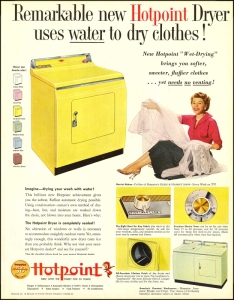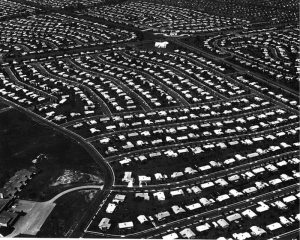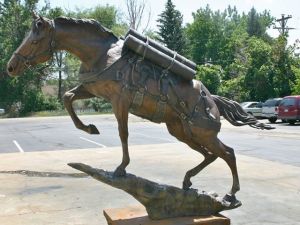USA Home Front 1950’s
By the time WWII was over, the American people were exhausted. They had given their all between enduring the Great Depression and then depriving themselves even more for the war effort. They had had rationing and lost their men. They wanted to forget it all and as quickly as possible. They wanted their lives to change, to move forward and they went for these goals with both feet.
The military at home was being drastically reduced and there was ample talk of eliminating the Marine Corps entirely. Among those in favor of that budget-cut included such men as: Omar Bradley, Dwight Eisenhower and Louis Johnson, Secretary of Defense. Johnson was responsible for the Corps being down to only 70,000 men, spread throughout the world.
When Pearl Harbor was attacked, the whole country, no matter where they were or what they were doing, remember hearing the news and were immediately aware that the country was at war. This was not so in 1950 when the North Korean army crossed the 38th parallel. As we enter the Korean War section, you will clearly notice the transformation on the home front. The lifestyle described in my guest posts for Greatest Generations drastically changes from the WWII era and partly accounts for why this became such a forgotten war.
The American public knew nothing of “police actions,” in fact, the term did not exist until the media coined the phrase. President Truman was capable of committing U.S. troops to a combat zone without a declaration of war by Congress – who knew? The idealism, enthusiasm and support from WWII was rapidly fading.
The civilians wanted communist aggression halted, but not at the cost of losing more troops; especially the longer it seemed to drag on – was it really worth the cost? There were very few protests against the war and some reason for that were the infamous McCarthy Senate investigations; many feared being put on “the list” of communist sympathizers. Joseph McCarthy’s accusations that the government contained “card-carrying” members proved unfounded, but his hearings continues, as did the newspaper headlines. The political atmosphere of the U.S. was poisoned and when General MacArthur was reined in – the situation deteriorated all the more.
In December 1950, Truman ordered that all statements made by government or military officials must be cleared by Washington first; the trust and support for the war dropped even farther. The polls showed 56% of all Americans felt the U.S. had made a mistake by getting involved. In the spring of 1951, the Truman administration became the most unpopular in American history (to that date). The president wanted a limited war, while MacArthur and many in Congress felt, “there is no substitute for victory.” A ‘win or get out attitude’ would begin the general’s dismissal and the polls read 60% for MacArthur and 29% for Truman.
America had changed. Salaries were up, unemployment was down to 2% and the public had money to spend. The American population was a mere 6% of the world, but they made about half of the manufactured products for the planet. Industry, without competition, booked in outrageous proportions. Detroit was rolling out both tanks and automobiles. Televisions hit the market in such quantities that 2/3 of all households owned at least one.
Despite nighttime news reports on the war, the public continued to get most of their updates in newspapers. The TV cameras, at the time, were still bulky and it was difficult to get them up to the front. But in the fall of ’52 and spring of ’53, the war headlines abated. (American lives were lost in large numbers in this time period in the small-scale engagements and the ferocious battle of Pork Chop Hill. These months were the stage of war depicted in the TV series M*A*S*H*.)
People went on vacations, traveled, went shopping without ration cards and the majority virtually went about their daily lives as if there was no war at all. Developments sprung up around the country of ‘cookie-cutter’ homes such as in East Meadow, Long Island and Levittown, PA. Couples picked out their new refrigerators and stoves. Children had backyards to play in with swing sets and no victory gardens taking up space. Women shopped for new clothes and kitchen items. Young men could even avoid the draft or postpone it with college deferments. Red Sox fans were torn between national pride and support of the team when Ted Williams was sent as a Marine pilot to Korea for 39 missions. But, he did return in time to finish out the 1953 season, batting over .400 in 37 games. After the 1930’s depression and 1940’s restrictions, Americans as a whole were enjoying the good life.
This was a time of contradictions that the “boomers” were born into. A population explosion mixed with political upheaval, the birth of rock ‘n roll, convenience, a totally new lifestyle and a hidden war that would set a president for all those that followed.
I did not have information about countries outside the U.S., so I would love to hear what life was like around the world at this period in time. Thank you all – you’re great.
#########################################################################################
Current News –
A monument was erected for War Horse, SSgt. Reckless at the National Museum of the Marine Corps, at Quantico, Virginia.
“You picture a horse, but she was truly a Marine.” _______ Mike Mason, Korean War Veteran
Two remarkable stories about the Korean war horse who received medals for her service, including carrying ammunition to the front in 51 trips under fire – in one day alone.
http://abclocal.go.com/kgo/story?section=news/national_world&id=9187461
http://www.sgtreckless.com/Reckless/About_Reckless.html
##########################################################################################
Farewell Salutes –
Eugene Wilkinson – Long Beach, CA; U.S. Navy (submarines), WWII, Silver Star, commander of nuclear sub “Nautilus”
Ponciano Tabac Ponce – Maui, Hawaii & L.A., CA; U.S. Army, Korean War
Clyde Shorey, Jr. – Washington D.C. & Cranberry Island, ME; U.S. Army Air Corps, WWII
David Goldfinger – Bronx, NY & Laguna Woods, CA; U.S. Air Force, sergeant in WWII
Charles McCreight – Oledo, OH & Lake Worth, FL; U.S. Army WWII
Joseph Bali – Gary, IN & Phoenix, AZ; U.S. Air Force, WWII
##########################################################################################
Posted on July 30, 2013, in Home Front, Korean War and tagged family history, History, Korean War, Military, Military History, nostalgia, Pacific War, SSgt. Reckless, veterans. Bookmark the permalink. 162 Comments.

















We in Denmark were quite poor after WWII. The German occupiers had had access to our National Bank and took what they needed. Therefor we were very grateful for the Marshall Help that influenced the situation for the better. Like in the USA the hunt for material goods came to us too, only maybe ten to twenty years later
LikeLiked by 1 person
I never realized it took so long in Europe. With so much having to be rebuilt, I would have thought many jobs would have been open.
LikeLike
We lacked materials of all kind which made it challenging to produce new stuff
LikeLiked by 1 person
I love your pictures; they take me back
LikeLiked by 1 person
Good memories, I hope.
LikeLiked by 1 person
Very good
LikeLiked by 1 person
Reblogged this on Truth Troubles.
LikeLiked by 1 person
Thank you!
LikeLike
Very good history lesson Sir, I enjoyed the read so I am going to reblog this one for you.
LikeLiked by 1 person
I appreciate the attention you give this site. You’ve helped to keep their memories alive!!
LikeLike
I think the U.S. was just as wrong to intervene in the Korean Peninsula’s already ongoing civil war just as it was wrong to intervene In Vietnam several years later. The fact that men and women whose gender, age, political connections, and other criterion exempted them from the draft when unfortunate reservists, draftees, and short-term volunteers had to serve in these two wars that had nothing at all to do with our country’s true national security needs was obscene. Why did the U.S. not learn from the pointless Korean War quagmire to stay out of the other continental Asian war in Vietnam?
LikeLiked by 1 person
At the time, the Korean War was not called that – it was a police action carried out by the United Nations. It may appear to you that it was an American operation because we were forced to contribute the most. Likewise, Vietnam was not considered a war at first (except by those who had to fight in it). Generals from WWII warned DC about getting in there but you can thank JFK. For a number of years, Nam vets couldn’t even join the VFW – because it wasn’t a war!! That hell-hole is a sore spot for me, sorry about all the exclamation points.
LikeLiked by 1 person
It must also be remembered that the U.N. became a mere figurehead of President Truman and his cadre of so-called National Security elites like Dean Acheson, Paul Nitze, et al. By dragging the U.N. into this continental Asian quagmire (or stalemate), Truman actually DAMAGED the credibility of the U.N. by converting it from a truly international referee into a co-belligerent acting as a mere cover for de-facto U.S. control over the “police action”. Indeed, the U.N. was under more influence from white supremacists in both this country and from those Western European nations that still had major empires in Asia and Africa based on the sick ideology of white racism. The fact that these nations, especially the U.S., controlled the U.N. while supporting such European colonialism, seriously damaged the U.N.’s integrity and credibility. It is ironic that Truman who claimed to be the civil rights president was, along with his Secretary of State Dean Acheson, very hostile toward those Africans and Asians who wanted self-determination from white European rule, while Truman’s successor Dwight D. Eisenhower and his supposedly more hawkish Secretary of State John Foster Dulles displayed far more sympathy towards these independence movements and far less sympathy toward the European powers who attempted unsuccessfully to cling to their empires until the 1956 Suez Crisis forced most Europeans to see the handwriting on the wall.
You’re right that the U.S. (and our puppet South Korea) furnished anywhere from 90 to 95% of the total fighting forces for that conflict. The U.N.’s forces were chiefly token window dressing to make the war look like an internationalist undertaking. This was why when Eisenhower decided to run in 1952 for the Presidency, he later on decided to be the peace candidate not only promising to secure an armistice (which he did in the summer of 1953), but to do his utmost to prevent the use of U.S. ground troops in former French Indochina. He knew how Korea lost whatever popularity it may have once had with the troops and American public and he was not about to repeat another war that would have involved the use of at least the same number of U.S. ground troops that Korea did–at least not while HE was president.
LikeLike
You are entitled to your opinion, but I think you overplay your hatred of America’s influence. And by calling other country’s soldiers “a mere token” is ignorant. They supply forces comparable to their population and by knowing a few of those soldiers, I know what they experienced as well. Look at ALL sides to a situation before you make such bias claims in the future. Things don’t exist in Black and White, everything has more than 2 sides and it all has to be taken into consideration, also try not to judge that world with your 2018 eyes.
LikeLiked by 1 person
Although we referred to this “police action” as a U.N. operation, the United Nations did not really control or drive this fighting. First of all, the Four Power Act that governed the Korean Peninsula in 1945 treated the region as a former part of the defeated Japanese Empire. That act had originally precluded the U.N. from any involvement from that region. By 1950, when Truman and Acheson decided to militarily intervene there, they first acted without consulting the U.N., and then got the U.N. to rubber stamp what was a de facto U.S. enterprise with a small number of soldiers from U.N. countries to give the war the appearance of an international endeavor. By using the U.N. as a cover, Truman actually damaged the U.N.’s credibility as a truly impartial international referee. The U.S. converted the U.N. into a co-belligerent taking all its orders from the White House, the Pentagon, and (very briefly) from Tokyo before MacArthur’s dismissal.
The permanent members of the Security Council, with the exception of Soviet Russia, were Western European countries that were trying desperately to cling to their African and Asian empires that were based on the sick ideology of white racism. Thus, Truman and Acheson, forced the U.N. to be a supporter of white racism and U.S. hegemony in East Asia instead of being a true beacon for human rights. Not until ca. 1960, would the U.N. even approach being truly representative of Third World people instead of a club for white empires.
The fact that the U.S. during this time had reinstated its preferential treatment for Japan (the former colonial ruler of the Korean Peninsula) that Japan had temporarily lost during the Second World War lays at least some truth to the charge that the U.S. was supporting colonialism in the two Koreas. The U.S. along with Apartheid South Africa of that same era even viewed the Japanese as “honorary” whites while referring to all Koreans as “gooks.”
These are many of the facts that would gradually make me equally disillusioned with the Korean Conflict as I am with the Vietnam Conflict.
LikeLike
I had no idea that the VFW would not let Nam Vets join for a while because it wasn’t a war! Oh my! Guess I can’t avoid the exclamation points either.
LikeLiked by 1 person
My father was furious about it too when I told him a friend of mine couldn’t join his local VFW. Being an officer of his own VFW, Smitty offered to let him join .
LikeLike
Reblogged this on KCJones.
LikeLiked by 1 person
Thank you for checking back in the archives to bring this one out again!
LikeLike
Ik ben geboren bij de bevrijding en kan me de jaren 50′ 60′ dus nog goed herinneren.Mijn grootvader heeft krijgsgevangen gezeten en mijn vader is weggevoerd maar ze zijn allenbei terug thuisgekomen
LikeLike
Thank you for sharing your story, MaryLou. It is always great to receive eye-witness accounts of the era.
LikeLike
I remember a time when one’s family was housed on one quarter of a father’s salary. And now, families can’t afford a humble house, with both father and mother working. We could afford a humble home and we went on a holiday every summer.
LikeLiked by 1 person
So do my family. But don;t you think that their frugal nature, after going through the Great Depression had something to do with that. They didn’t spend $700 on a Playstation for each kid at Christmas, go get their nails done every week, etc.
What are your thoughts on this?
LikeLike
The advertising material seems so different from what we see today. It is a remarkable story how we survive and move on. Wonderful content, again.
LikeLike
I enjoy the trip back though sometimes – I DID enjoy the 50’s and 60’s.
LikeLike
Always happy to see someone looking in the archives! Thanks.
LikeLike
Pingback: FEATURED BLOGGER REPORT: Truman and the Pacific War | Pacific Paratrooper #AceHistoryDesk reports | ' Ace Worldwide History '